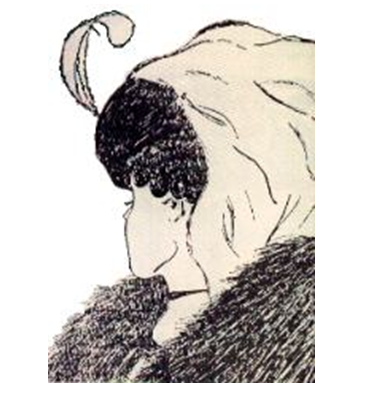Just around the corner from where I live is The Herbal Path, a Chinese health and medicine shop. Yesterday, I was looking at some of the diagrams they have pasted in their store window. Those diagrams illustrated the meridians in our bodies, the rivers of energy within our body, the Qi (pronounced “chee”) flow. With a reframe, I see those rivers as collaboration flows.
Our mind can hold opposing views. Check out this classic drawing it’s from the mid-1800s. Is it an old woman or a young girl? “It’s both, of course. The yin yang of our minds!
I’ve seen this image many times, over the years. Strange, sometimes I look at it and I only see one image, one person. For the life of me, I can’t seem to see the flip side, the other person. What’s going on?
When our mind is fixated on one thing, it can be really hard to see, to imagine, something different. The shift, the flow, to something else, is blocked. I see it all the time in others, when mediating conflicts. It’s important, though, to hold out for a different narrative, a different story to flow to. Our stories define us.
Chinese medicine and health is very much concerned with the flow of energy in your body. When that flow is blocked, when an obstacle obstructs the flow, for whatever reasons, our whole being is constrained. Everything we do can then seem more difficult, or impossible, to do. Freeing up the obstruction is basic to free flow of energy.
A good chunk of my business involves project work, and facilitating change. As a business systems consultant, I’ve worked (and continue to) on lots of projects where the key to success was a smooth transition from the old to the new state-of-mind and being. There is always a period of transition from one state to another. That transition is part of the natural flow between old and new. William Bridges Managing Transitions has been forefront on my bookshelves for a long, long time.
In many ways, the art of the collaboration requires us to reframe the transition, the flow from the old to the new. Facilitators, mediators, parents respect that transition, in others. And, we want to do it for ourselves, too!
So, be good to yourself. You already know the importance of your vision, a more collaborative you. Align your daily intentions and actions with the direction of that vision. Respect that there are obstacles along the way. Find ways to let go of, or at least sidestep, those obstacles. Maybe spend some time wandering, in the neutral zone, for a while. And, then gradually create a new story for yourself; learn and experience your way to it, through thinking and doing.
2013 is just getting underway. It’s a good time to shape a reframe that will enable the rest of your year to flow smoothly.
What’s one reframe you’ll hold on to, this year?


So very well written, Ben and sharing such wisdom.
“When our mind is fixated on one thing, it can be really hard to see, to imagine, something different. The shift, the flow, to something else, is blocked. I see it all the time in others, when mediating conflicts. Its important, though, to hold out for a different narrative, a different story to flow to. ”
It is a dangerous thing to others and surprise, even us, when our narrative doesn’t allow room for even attempting to see a conflict through another party’s eyes and then compounding that error with a lack of empathy for their concerns and needs.
It takes courage, discipline and commitment to go the route you suggest but the rewards for one’s life should make it attractive.
Thanks Michael. Your point about “compounding that error… ” is a good one. Makes the challenge even more daunting! Yet, its a good reminder that real engagement comes with a price to us.
I like your point about “price” Ben, as of course, I use it often myself! There are price tags in life on behavior, whether that’s positive or negative engagement or no engagement at all. We all have to decide if we’re willing to pay that price of our choice. If we are, we better be happy with the result. You’re insightful, real engagement clearly comes with a price. It’s usually worth the investment though.
Hey Ben,
I think this concept of flow is really interesting. There is another meaning of flow discussed in psychology: “the mental state of operation in which a person performing an activity is fully immersed in a feeling of energized focus, full involvement, and enjoyment in the process of the activity.” Flow can be when you are doing that sport you love and time just flies by or when you are immersed in a conversation and fully present. Csíkszentmihályi talks about flow in the workplaces and in collaboration. For me, flow is something I seek out and the feeling helps me know I am on the right track and find satisfaction. Do you feel flow when you’re facilitating?
(good starter on flow: http://en.wikipedia.org/wiki/Flow_%28psychology%29#Group_flow)
I wonder how flow is related to flow, or Qi? How do we create the space for flow, in both senses of the word, in order to collaborate from our most authentic self? I think flow in work and in collaboration are key for transitions in our changing times. Especially when talking about shifts to more sustainable business, community and selves.
Sarah Rose
Hi Sarah… thanks for your thoughts re: flow. Great points and references. I know there are some traditional contexts for experiencing flow, as you mentioned (eg. sports, work…). Funny, maybe I was in a flow state participating in the #yyjchat last week. Totally, lost track of time! Did you?
Good point about Qi. Yes, definitely a connection to flow. As I understand the essence of having good Qi, its all about unblocking bad stuff in your system, in order to facilitate flow.